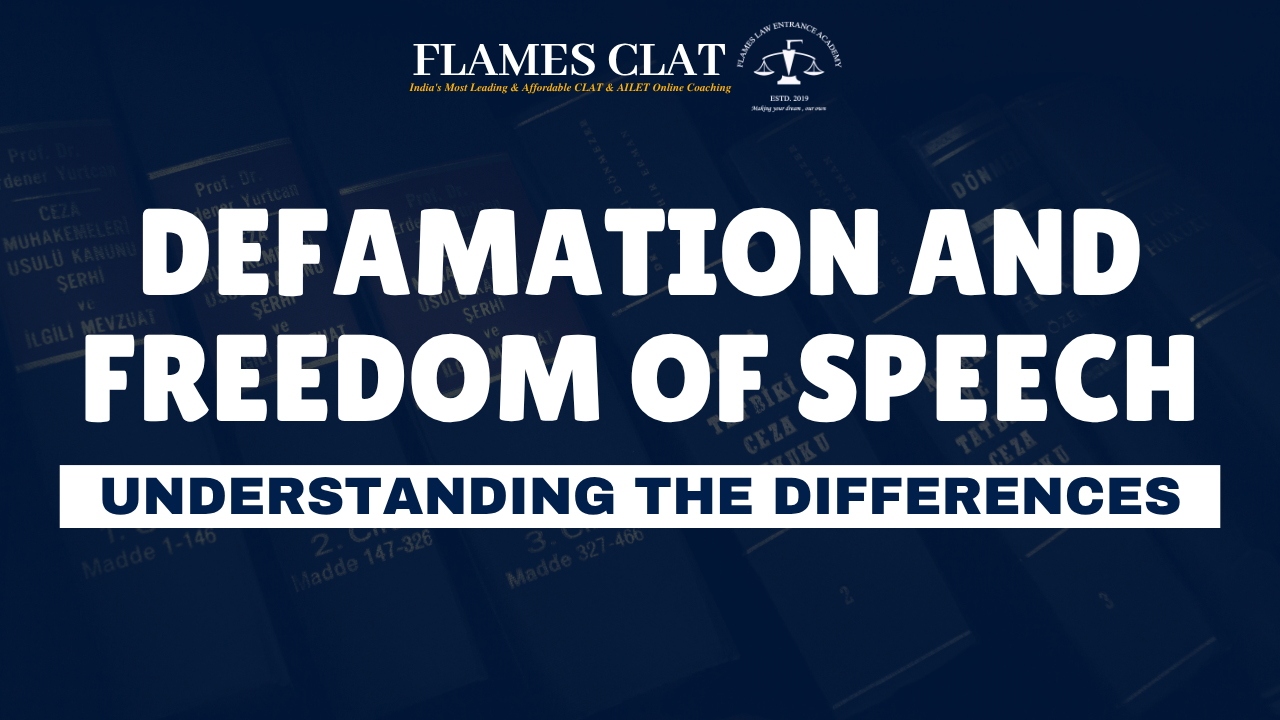Defamation and Freedom of Speech: Understanding the Differences
With the advent of the rise in social media platforms, people now enjoy unprecedented access to express their opinions to a larger audience, without any restrictions. This freedom of speech is distinct and contradictory to Defamation, yet it is closely linked. While the right to freedom of speech allows citizens to express themselves freely, without significant restrictions, defamation laws restrain people from making false and derogatory remarks that tarnish a person’s reputation in the eyes of others. Thereby, drawing a fine line between Freedom of Speech and Defamation. At Flames CLAT Academy, where future legal professionals are trained to think critically and interpret evolving laws, such provisions are frequently debated in classes and workshops to nurture socially aware legal minds. This blog explores the constitutionality and societal implications of defamation laws and freedom of speech.
Defamation in Tort Law
A person's reputation is considered his asset, and any injury to it is justiciable. This right to protect reputation is a right in rem, i.e., a right that can be used against all people in the world. Defamation is the reputational damage or harm in the eyes of a third party caused by making a false statement. It can be either a spoken (slander) or a written statement (libel).
Elements of defamation:
- False Statement: A Defamatory statement should not be true.
- Publishing to third party: A Third party other than the Plaintiff should have heard or read the defamatory comments. The third person should believe the statement to be true.
- Malicious intention: The wrongdoer is aware that the false statement has the potential to harm the reputation of the Plaintiff.
- Injury: The publication of the derogatory statement must cause some injury to the Plaintiff.
Defenses available against Defamation
- Truth
If the statement is true, then it does not amount to defamation. It is an absolute defence the tort of defamation.
- Absolute Privilege
It gives immunity to persons making defamatory statements. Absolute privilege exempts statements made during judicial proceedings, by government officials, by legislators during parliamentary debates, communication between spouses, etc.
- Parliamentary Privilege
Art. 105 and Art. 194 confer immunity to members of Parliament and the State Legislature from anything said during the sitting of the parliament, and they cannot be held liable in any court for statements made in debates of parliament.
- Bonafide Comment
Any comment in the public interest, without any malicious intention, shall not come under defamation. It also includes criticism of public policy, laws, etc.
- Fair Comment
This defence can be claimed only in respect of facts and opinions, not necessary to prove the truth.
- Justification
It can be pleaded in matters of opinion where the defendant has to prove that the views expressed were accurate and he honestly held them.
- Statement of Opinion
When the statement made is only an opinion and does not cause any damage to the plaintiff.
- Consent
Consent by the plaintiff to the publisher gives them absolute privilege from liability even when the statement made is derogatory.
Freedom of Speech and Expression
People voicing their views, opinions, beliefs, and ideas, without fear and threat, is the true essence of a democracy. Maintained under Art. 19 of the Indian Constitution, the freedom of speech and expression guarantees its citizens the right to express themselves. However, there are certain exceptions to this right to protect its unconstrained use, leading to social disorder and unrest.
These reasonable restrictions include -
- Security of State
- Friendly relations with foreign states
- Public order
- Decency and Morality
- Contempt of Court
- Defamation
- Incitement of an offence
- Sovereignty and integrity of India
While these exceptions, time to time, have been contested for infringing freedom of speech, they play a significant role in ensuring this right is not exploited.
Some Relevant Case Laws
- Subramanian Swamy v. Union of India (2016)
SC upheld the constitutional validity of Sections 499 and 500 of IPC, 1860, which criminalised defamation.
- New York Times Co. v. Sullivan (1964)
U.S. Supreme Court required public officials to prove defamatory statements made to be either knowingly false or made with heedless disregard of the truth, thereby preventing exploitation of defamation laws to suppress criticism.
- Chaman Lal v. State of Punjab (1970)
In this case, the Supreme Court established good faith and bona fide comment as an exception to Section 499 of the IPC.
- MC Verghese v. TJ Ponnan (1970)
The Court held that communication between spouses does not fall under the privileged communication under Section 499 of the IPC.

Conclusion - Balancing between Defamation and Freedom of Speech
Humans spend years building a reputation within society, and they have the right to protect their reputation under the Right to Life guaranteed by Article 21. Thus, the freedom should not come at the cost of reputational loss. Defamation, being a reasonable restriction on the freedom of speech and expression, rightly protects the repute of these individuals. Legal educators at Flames CLAT Academy continue to emphasize such debates as essential for aspirants preparing for CLAT and judiciary exams, where understanding constitutional morality and legal reform are not just academic goals but tools for real-world impact.
Join our Flames CLAT Family at https://t.me/flamesclat
For Informative videos, do check out https://youtube.com/@flamesclat?si=-PqiaRLEjutM-iYj




Write a Review
Your email address will not be published. Required fields are marked *